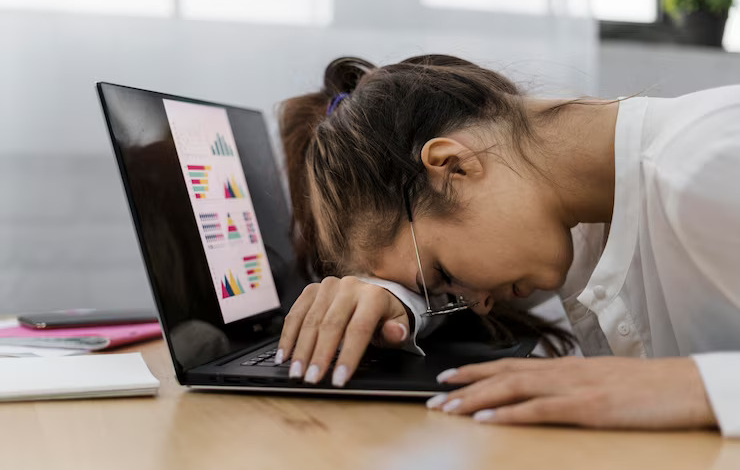
Afternoons are often associated with fatigue and sleepiness. Many people fall asleep or struggle to stay awake during this time of day.
However, avoiding sleep in the afternoon is crucial because it may disrupt your sleep pattern and impair your productivity for the rest of the day.
Why am I feeling so sleepy in the afternoon?
Several factors could contribute to the afternoon decline. One of the most widely accepted hypotheses is that the body’s circadian rhythm slows between 1 and 3 p.m. This fall is known as the “afternoon slump” or “post-lunch dip.”
Daytime sleepiness can be caused by sleep loss, poor nutrition, dehydration, a lack of physical activity, and medical problems such as sleep apnea and narcolepsy.
Other lifestyle factors, such as stress and worry, might contribute to afternoon fatigue. Stress may keep you from obtaining a decent night’s sleep, leaving you sluggish and fatigued throughout the day.
How to prevent sleeping in the afternoon.
Get adequate sleep each night.
One of the most prevalent causes of noon tiredness is insufficient sleep at night. To avoid sleeping in the afternoon, maintain a consistent sleep schedule and get at least 7-8 hours of sleep per night. This will allow you to obtain a better night’s sleep and feel less tired in the afternoon.
Stay active throughout the day.
Staying active during the day is another method to avoid the afternoon slump. Physical activity, especially exercise, can help you stay energized and relieve tiredness. Take a short stroll, stretch, or participate in other enjoyable physical activity.
If you’re drowsy in the afternoon, staying busy throughout the day is a surefire strategy to avoid falling asleep. Physical activity and exercise have been shown to enhance oxygen and blood flow to the brain, resulting in improved mental clarity and attention. Plan on getting some physical activity into your day, whether it’s a brisk stroll during your lunch break, stretching exercises at your desk, or using the stairs instead of the elevator.
Regular physical activity can improve the quality of your nocturnal sleep, potentially reducing your chances of feeling tired during the day. Even while exercise can help you stay awake in the afternoon, you should listen to your body and avoid pushing yourself too hard.
Take breaks and stretch.
If you work at a desk or spend a lot of time sitting, getting up and moving around will help you avoid afternoon fatigue.
Sitting for extended periods can impair blood flow and oxygenation, resulting in fatigue and drowsiness. Taking frequent breaks to get up and walk about improves blood flow and keeps you attentive.
Neck rolls, shoulder shrugs, and leg stretches are all simple stretches you may do at your desk. Take short walks around the office or outside during breaks to get some exercise and fresh air.
The risk of developing musculoskeletal pain and injuries from prolonged sitting can be decreased by taking frequent breaks and incorporating movement and stretching throughout the workday.
Avoid large meals and caffeine.
Several factors, such as a heavy dinner or a caffeine excess, could cause afternoon sleepiness. Caffeine consumption can disrupt typical sleep cycles, causing an energy decrease later in the day.
To avoid feeling sleepy in the afternoon, eat a light and healthy lunch high in complex carbs, protein, and healthy fat. Consuming foods high in these nutrients will help you avoid energy slumps and lows throughout the day.
Caffeine consumption should also be carefully monitored. Caffeine can temporarily boost alertness and focus, but excessive consumption can cause jitters, anxiety, and energy dips. Caffeine should be consumed in moderation, no more than 400 milligrams (mg) per day (about four cups of coffee).
If you’re trying to cut back on caffeine, herbal tea and water with lemon or cucumber slices are both fine choices. Staying hydrated is essential for preserving your energy and preventing the lethargy and sleepiness produced by dehydration.
Get some sunlight.
The circadian rhythm functions as the body’s internal “clock,” regulating the amount of time spent sleeping and awake. Sunlight exposure has been shown to influence the circadian rhythm, improving sleep and wakefulness. Going outside during the day and soaking up some rays tells your body that it’s time to become more alert and aware.
Getting sun has also been found to improve one’s mood and vitality. As a result of being in the sun, your brain will start to manufacture more serotonin. Serotonin is a neurotransmitter that regulates mood, appetite, and sleep. High levels of serotonin are associated with greater happiness and energy.
Try to get some sunlight during the day, even if it’s only for a few minutes at a time. During your lunch break, consider taking a short walk or locating a calm outside area to unwind. If you have to work in an environment without windows, you could try using a light therapy lamp to simulate the effects of being outside in the sun.
Use of medication
You can also get effective sleep medications like Waklert 150, Artvigil 150, Modvigil 200, and Modalert 200. These tablets are generally available through some internet health shops, like Buygenericpills. Place your order, and the meds will be delivered as your HCP prescribes.
Conclusion
If afternoon sleepiness is a recurring problem, it can be annoying and disruptive to your daily routine. However, Waklert 150 mg may help you prevent afternoon fatigue and preserve your energy and productivity throughout the day.
Avoiding large meals, drinking too much coffee, being inactive, pausing, stretching, sticking to a regular sleep schedule, and getting some sun are all crucial habits to develop and maintain. You can avoid becoming lethargic in the afternoon by staying focused and awake throughout the day.


